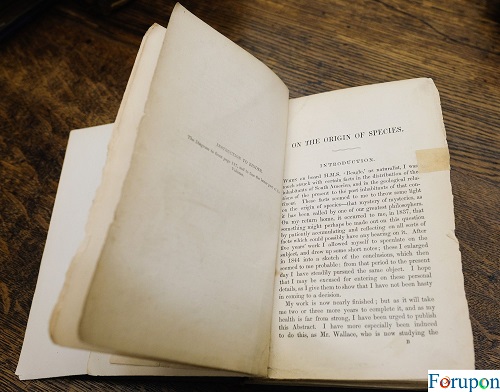Natural Selection
For upon |Natural selection is the process through which populations of living organisms adapt and change. Individuals in a population are naturally variable, meaning that they are all different in some ways. This variation means that some individuals have traits better suited to the environment than others. Individuals with adaptive traits—traits that give them some advantage—are more likely to survive and reproduce. These individuals then pass the adaptive traits on to their offspring. Over time, these advantageous traits become more common in the population. Through this process of natural selection, favorable traits are transmitted through generations.
On the Origin of Species
English naturalist Charles Darwin wrote the definitive book outlining his idea of natural selection, On the Origin of Species. The book chronicled his studies in South America and the Pacific islands. Published in 1859, the book became a bestseller.
English naturalist Charles Darwin developed the idea of natural selection after a five-year voyage to study plants, animals, and fossils in South America and on islands in the Pacific. In 1859, he brought the idea of natural selection to the attention of the world in his best-selling book, On the Origin of Species.
Natural selection is the process through which populations of living organisms adapt and change. Individuals in a population are naturally variable, meaning that they are all different in some ways. This variation means that some individuals have traits better suited to the environment than others. Individuals with adaptive traits—traits that give them some advantage—are more likely to survive and reproduce. These individuals then pass the adaptive traits on to their offspring. Over time, these advantageous traits become more common in the population. Through this process of natural selection, favorable traits are transmitted through generations.
Natural selection can lead to speciation, where one species gives rise to a new and distinctly different species. It is one of the processes that drive evolution and helps to explain the diversity of life on Earth.
Artificial Selection
Darwin chose the name natural selection to contrast with “artificial selection,” or selective breeding that is controlled by humans. He pointed to the pastime of pigeon breeding, a popular hobby in his day, as an example of artificial selection. By choosing which pigeons mated with others, hobbyists created distinct pigeon breeds, with fancy feathers or acrobatic flight, that were different from wild pigeons.
Darwin and other scientists of his day argued that a process much like artificial selection happened in nature, without any human intervention. He argued that natural selection explained how a wide variety of life forms developed over time from a single common ancestor.
Darwin did not know that genes existed, but he could see that many traits are heritable—passed from parents to offspring.
Mutations are changes in the structure of the molecules that make up genes, called DNA. The mutation of genes is an important source of genetic variation within a population. Mutations can be random (for example, when replicating cells make an error while copying DNA), or happen as a result of exposure to something in the environment, like harmful chemicals or radiation.
Mutations can be harmful, neutral, or sometimes helpful, resulting in a new, advantageous trait. When mutations occur in germ cells (eggs and sperm), they can be passed on to offspring.
Environment Changes
If the environment changes rapidly, some species may not be able to adapt fast enough through natural selection. Through studying the fossil record, we know that many of the organisms that once lived on Earth are now extinct. Dinosaurs are one example. An invasive species, a disease organism, a catastrophic environmental change, or a highly successful predator can all contribute to the extinction of species.
Today, human actions such as overhunting and the destruction of habitats are the main cause of extinctions. Extinctions seem to be occurring at a much faster rate today than they did in the past, as shown in the fossil record.

English naturalist Charles Darwin wrote the definitive book outlining his idea of natural selection, On the Origin of Species. The book chronicled his studies in South America and the Pacific islands. Published in 1859, the book became a bestseller.
Photograph by Ian Forsyth via Getty Images
The article was originally published here.


Comments are closed.